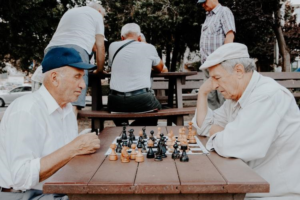Maria Clara Gonçalves Monteiro de Oliveira, Undergraduate student in Psychology at the Catholic University of Brasília (UCB), Brasília, Federal District, Brazil.
Henrique Salmazo da Silva, Professor of the Graduate Program in Gerontology at the Catholic University of Brasília (UCB), Brasília, Federal District, Brazil.
The study “Elderly individuals in multigenerational households: family composition, satisfaction with life and social involvement”, published in the periodical Estudos de Psicologia (Campinas, vol. 37) addresses the relation between the make-up of the family in the domicile and social-demographic conditions, functional performance, humor, perceived social support, and satisfaction with life in cognitively healthy long-living elderly. Conducted between the years 2016 and 2018, it is part of a larger research project aimed at assessing the aging standards in long-living elderly in three scenarios: in outpatient care (Federal District), at home (Campinas, São Paulo state), and in long-term institutions (Passo Fundo, Rio Grande do Sul state).
Research with long-living elderly is still rare in Brazil, despite the fact that this is the fastest-growing population in the country and in the world. Thus, the research was developed so as to procure data on the living and health conditions of this population, which can subsidize the drafting of programs for care and services in the scope of Gerontology, the science which studies aging under the biopsychosocial perspectives. One of the discussions in the area is centered on understanding the role of the family and of living arrangements in the welfare of long-living elderly, seeing that types of arrangement may be associated with different standards of aging, support, and coexistence. It can be seen that the relations which develop may be both beneficial — associated with a higher well-being and satisfaction with life — or stressing, by representing a dissonance between the support received and the support offered by the long-living person. This knowledge may foster the drafting of support programs aimed at the long-living elderly and their families.
This research investigated 107 long-living and cognitively healthy elderly, that is, with no signs of cognitive decline and evaluated at a Geriatric outpatient clinic in the Federal District (DF). The investigated living arrangements were “living alone”, “uni- or bi-generational”, or “tri-generational” (elderly, children, and grandchildren). The results indicated that the group of long-living elderly that reported tri-generational arrangements was made up primarily of female elderly, widow(er)s and with a larger number of children; and the elderly who resided in uni- or bi-generational domiciles were more satisfied with life in comparison with people of the same age, and reported a higher participation in cultural activities and driving an automobile.
In summary, the living arrangements in advanced old age are associated with family arrangements and with variables of satisfaction with life and social engagement. However, it is important to highlight that the data pertain to the reality of octogenarians and nonagenarians from an outpatient sample within the Federal District, and that this population has a peculiar characteristic. It is a sample primarily made up of people who moved from other Brazilian states for the foundation of Brasília. Thus, they possess standards of behavior, emotion and relationships that are already established and permeated by diverse sociocultural characteristics. Generational or cultural standards may moderate factors such as frequency of contacts, proximity, orientation and composition of social networks. Therefore it becomes necessary to conduct more studies with long-living Brazilians, in order to assess if the living arrangements in advanced old age follow the same associations with social-demographic variables, satisfaction with life, and social participation and engagement. In summary, the findings highlight the need for deeper study of the organization of the patterns of relationship and generational exchanges in living arrangements for the long-living.
In the following video watch the reflection of Henrique Salmazo da Silva and Maria Clara Gonçalves Monteiro de Oliveira.
To read the article, access
OLIVEIRA, M. C. G. M. de et al. Elderly individuals in multigenerational households: Family composition, satisfaction with life and social involvement. Estud. psicol. (Campinas) [online]. 2020, vol. 37, e180081, ISSN 0103-166X [viewed 27 April 2020]. DOI: 10.1590/1982-0275202037e180081. Available from: http://ref.scielo.org/qs9dpy
External links
Estudos de Psicologia (Campinas) – ESTPSI: www.scielo.br/estpsi
http://periodicos.puc-campinas.edu.br/seer/index.php/estudos
Página do Programa de Mestrado e Doutorado em Gerontologia da Universidade Católica de Brasília: https://ucb.catolica.edu.br/portal/curso/gerontologia/
Página Research Gate – Prof. Henrique: https://www.researchgate.net/profile/Henrique_Silva7
About the authors
 Maria Clara G. M. Oliveira, Graduated in Psychology at the Catholic University of Brasília (UCB), focuses on research in Human Development Psychology focused on the learning area.
Maria Clara G. M. Oliveira, Graduated in Psychology at the Catholic University of Brasília (UCB), focuses on research in Human Development Psychology focused on the learning area.
E-mail: m.claragonc@gmail.com
Lattes: http://lattes.cnpq.br/5061551482684319
Instagram: @m.clarag
 Henrique Salmazo da Silva, gerontologist, PhD in in Neuroscience and Cognition from the Universidade Federal do ABC (2016), Brazil. Currently is Professor of the Graduate Program in Gerontology at the Catholic University of Brasília (UCB). Researches themes related to human cognition; cognitive aging and plasticity; semantic memory, language and embodied cognition; successful aging; long-term care; public policies for the elderly and Gerontology as a science and profession.
Henrique Salmazo da Silva, gerontologist, PhD in in Neuroscience and Cognition from the Universidade Federal do ABC (2016), Brazil. Currently is Professor of the Graduate Program in Gerontology at the Catholic University of Brasília (UCB). Researches themes related to human cognition; cognitive aging and plasticity; semantic memory, language and embodied cognition; successful aging; long-term care; public policies for the elderly and Gerontology as a science and profession.
E-mail: henriquesalmazo@yahoo.com.br
Lattes: http://lattes.cnpq.br/7516363405111630
……………………………..Instagram: @henriquesalmazo
Como citar este post [ISO 690/2010]:












Recent Comments